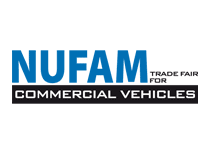What is the alternative drive of the future? Controversial discussion at the NUFAM Media Day
The NUFAM Media Day took place for the first time on June 22at the Karlsruhe Trade Fair Centre. In addition to information on the commercial vehicle trade fair in September, there was a controversial discussion on the future of alternative drives.

Welche ist die alternative Antriebsart der Zukunft und wie lässt sich diese am besten in den Alltag von Fuhrparkleitern und Herstellern integrieren?“ – über diese Fragen haben am Donnerstag, 22. Juni, Christian Bodi, Geschäftsführer Logistik des Karlsruher Drogerieunternehmens dm, Kurt Sigl, Präsident des Bundesverbands eMobilität, Dr. Olaf Toedter, Leiter der Forschungsgruppe „InnoFuels“ am Karlsruher Institut für Technologie (KIT), und Thomas Weidinger, Head of Field Sales Fuel Cards bei Wex, diskutiert.

Outlook for NUFAM
The discussion was part of the first NUFAM Media Day. The aim of the new format was to provide information about NUFAM - The Commercial Vehicle Show from 21 to 24 September, but also to use the discussion to get closer to the practical experience of exhibitors from the commercial vehicle industry. Britta Wirtz, Managing Director of Messe Karlsruhe, gave a brief introduction to NUFAM and Karlsruhe as a mobility location. Jochen Bortfeld, Project Manager of NUFAM, first took a look at the upcoming NUFAM. "With 420 to 450 exhibitors, NUFAM will be the biggest in its history so far. Three months from today, we will meet here again," he told around 60 guests who had come to the sunny atrium of Messe Karlsruhe. After the introductory words, they followed a lively and controversial discussion on the question of the right alternative drive for the future. In a good 75 minutes, the discussants wrestled with solutions in a fair manner, but hard and controversial in terms of content.
Christian Bodi, Managing Director of Logistics at dm-drogerie markt, began by talking about two pilot projects. The drugstore group from Karlsruhe supplies shops in Bonn and Nuremberg with e-trucks and hydrogen trucks respectively: "We are experimenting! We want to test the technology with our partners under normal conditions," said Christian Bodi. It is a matter of starting, gathering experience, and then deciding how to proceed. The managing director of logistics emphasised that the costs of hydrogen trucks are still about two and a half times higher on average than those of diesel-powered trucks. Bodi emphasised that in the future it would be a matter of exploring the advantages and disadvantages of different alternative drives in practice. It is about working together constructively in the "very complex" search for alternative drive systems of the future. Companies must be clear about what is necessary from a social as well as a business point of view in order to ultimately act accordingly.
Kurt Sigl, President of the Federal Association of eMobility, emphasised that it was open to technology. There is no ideology involved: "What currently works the easiest is e-mobility. The president of the Bundesverband eMobilität went on to say: "If you wait for politics, you can wait forever." Kurt Sigl pointed out that other players from China or the USA were already fighting for dominance of the new market. A development time of eight to ten years no longer exists: "It's all about speed. We are no longer alone," Kurt Sigl made clear. Kurt Sigl could not answer the question of what the alternative drive of the future would be, but: "What we currently have is almost nothing.

Dr. Olaf Toedter from KIT, on the other hand, is convinced that there will be a mix of different types of drive in the future: "The decisions are so complex that any simplification won't work." Companies would always have to look at the areas in which they are travelling and with which ranges. For short distances, the answer could be e-mobility, for longer distances synthetic fuels.
Thomas Weidinger, Head of Field Sales Germany at WEX, also took part in the discussion. WEX offers fuel cards with Esso and other providers and is an exhibitor at NUFAM in September. An important part of WEX’s mission is the integration of alternative fuels in the future. “We focus on the needs of our customers who are keen to expedite their energy transition.” WEX is ready to accompany them on their journeys to alternative fuels. "While the classic diesel is still a part of many fleets, companies are looking for fuel card providers such as WEX to help them make the transition.“


